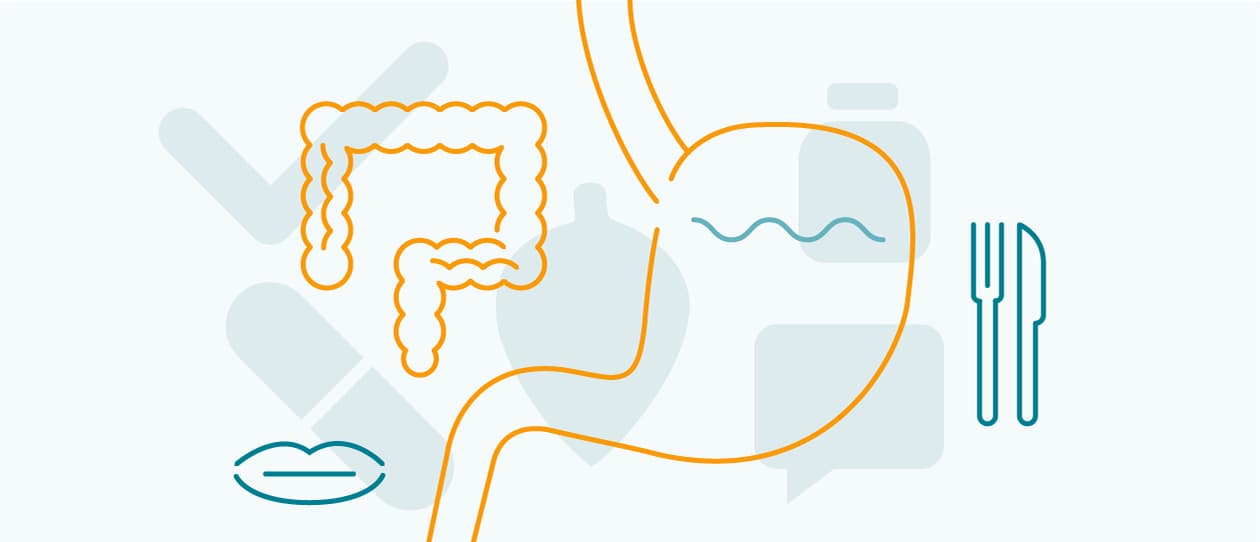
- Health hub/
- Tips & Advice on Improving your Digestive Health/
- Irritable bowel syndrome


Irritable bowel syndrome is characterised by digestive symptoms such as those below. Their presence may be related to stress, low mood or anxiety:
- Constipation and/or diarrhoea (sometimes alternating)
- Cramping abdominal pain
- Bloating
- Flatulence, belching, and louder than normal stomach rumbling and bowel noises (borborygmi)
- Bad breath and headaches may occur
- Abnormal stools (e.g. large dry stools, watery or ribbon-shaped stools; food particles or mucus may be visible in stools)
- Symptoms generally, but not always, occur soon after eating or drinking and may be relieved by passing a bowel motion
- Sufferers may feel that their bowel movement is incomplete
- Some women experience worsening of their symptoms during the menstrual period
- Sufferers who experience ongoing diarrhoea are at risk of nutritional deficiency due to malabsorption
As part of the digestive process, the intestines move food through the intestinal tract by muscular bowel contractions called peristalsis. Irritable bowel syndrome occurs when peristalsis develops inconsistencies such as abnormal muscle movement or spasm of the lower part of the colon.
Sometimes the spasm delays the bowel movement, causing constipation. At other times it may lead to more rapid passage of the stool, resulting in diarrhoea, or small stools that are not well formed. Although the causes of IBS are not yet fully understood, the nervous system is believed to play a role by interfering with normal peristaltic movement.
Other factors that have a role are food allergies and intolerances. Commonly problematic foods include meat, dairy products, fatty foods, chocolate, alcohol, carbonated beverages and artificial sweeteners. Gluten from grains such as wheat and barley may also trigger or aggravate symptoms for some sufferers.
IBS is sometimes triggered by a bacterial or parasitic infection of the bowel and its subsequent treatment with antibiotics. The disruption of the ‘friendly’ bacteria in the bowel that is caused by both the infection and the treatment may be involved in this phenomenon.
- Regular exercise helps your body to cope with stress and anxiety by stimulating the brain to release "feel good" chemicals called endorphins.
- Developing new stress management techniques such as meditation and relaxation may aid the management of your symptoms. Your health care professional can refer you to specialists in this area.
- Ensure you drink 6-8 glasses of water each day. Water is essential if you are experiencing constipation and replaces the extra fluid lost if you are experiencing diarrhoea. Patients with diarrhoea may also benefit from an electrolyte replacement formula to decrease the risk of dehydration.
- Keep a symptom diary to assist you in pinpointing any foods that trigger your IBS symptoms. Remember that IBS is a changeable disease, and watch for a regular response over several occasions before excluding a particular food from your diet. Avoid any foods that you identify as being triggers of your IBS symptoms. Common food intolerances to consider include dairy and grains (such as wheat).
- Talk with your health care professional about whether a fibre supplement is suitable for you. Remember that it is common for symptoms such as bloating to temporarily worsen until your body gets used to the increased fibre. Fibre supplements are more likely to be of benefit if you experience constipation than if you experience diarrhoea. However, note that wheat bran may aggravate your problems, especially if you have an allergy or intolerance to wheat or gluten.
- Avoid sugary foods, which may interfere with the balance of bacteria in the intestinal tract and slow down peristalsis.
- Slippery elm powder has traditionally been used to soothe irritated or inflamed mucous membranes of the digestive tract, and may help to relieve pain and promote healing. However, it may interfere with the absorption of other medicines; separate doses by two hours.
- Good digestion starts in the mouth. Taking the time to chew your meals properly means that the digestive processes have already started before the food arrives in your stomach, and also gives your stomach adequate time to prepare for the food's arrival by producing the enzymes and gastric juices needed for its digestion.
Consult you health care professional if:
- You are experiencing the symptoms described above, as it is important to rule out other conditions with similar symptoms, including ulcerative colitis and Crohn’s disease
- There is blood or mucus in your stools, on the toilet paper or in the toilet bowl when you pass a bowel motion
- You have symptoms of IBS in combination with a fever, or unexpected weight loss




